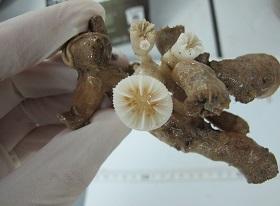Special Issue: Water Narratives
24 December 2025
Published online 12 October 2013

The discovery of corals in the warm, deep waters of the Red Sea will help scientists understand how reefs respond to climate change and which genetic and epigenetic adaptations allow them to survive warm temperatures.
A team from the King Abdullah University of Science and Technology (KAUST) found six species of corals dwelling between 200 and 800 metres in Red Sea waters, at temperatures exceeding 20°C, previously thought too warm to support corals usually found in cooler, shallower waters.
In response to a 1904 reference by Emil von Marenzeller, an Austrian zoologist, the team sent a remotely operated vehicle (ROV) to look for traces of deep-sea coral. Christian Voolstra, a marine biologist at KAUST and one of the chief scientists on the expedition, described its valuable findings.
"On the first day, we sent the submersible to one of the sites described by Marenzeller and found the first specimen in five minutes!" he says. The next day eight hours scrutinizing the sea floor yielded nothing.
Voolstra says only three of the species discovered were studied, because the fourth species only had one polyp – the building block of corals – and the other two were inacessible. "Deep-sea corals lodge themselves in rock crevices, overhangs and faults' edges and are very difficult to collect without damaging the very expensive material we had," says Voolstra. They used a little robotic arm to collect the three species Dendrophylliidae, Caryophylliidae and Dendrophyllia, publishing their results in Scientific Reports.
These corals are 20–30cm in length, and only the distal part was alive, an adaptive mechanism to minimize their metabolic requirements. In the dark waters where these corals grow, symbiotic algae that usually produce energy through photosynthesis cannot survive. "We will experiment with the few live specimens we have to understand how they could survive in this oxygen and nutrient deprived environment," says Voolstra.
One theory is that the corals have a complex symbiotic relationship with bacteria that allows them to metabolize nutrients in an oxygen-deprived environment. The researchers will study the bacteria and coral host's genes and their expression to understand their metabolic pathways. "This will hopefully provide further clues into how deep-sea corals survive in the Red Sea," says Voolstra.
Voolstra says: "If we want to learn about how organisms fare in times of environmental changes it is important to look at the environments where they can still exist."
Moshira Hassan, a marine ecologist, guest researcher at the Free University of Berlin and vice president of Reef Check Germany, says the discovery in the aphotic zone of the Red Sea was important.
She explains that corals are records of acidification and temperature changes at the depths they are found and so these specimens will help scientists to understand how coral reefs respond to climate change. Monitoring these species' reaction to increased water acidity and temperature will give further insight to their shallow water counterparts, she says.
doi:10.1038/nmiddleeast.2013.179
Stay connected: